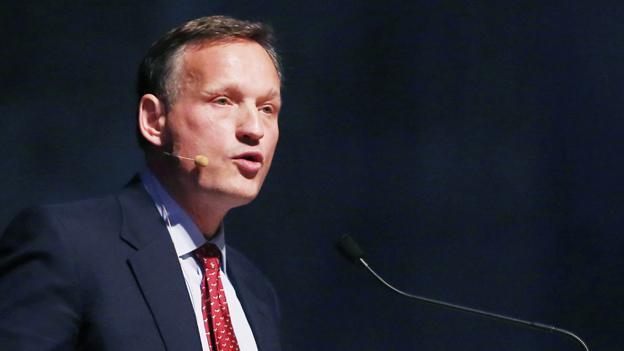Barclays: profits down, bonuses up. Why?
- Published
- comments

Antony Jenkins, Barclays chief executive
On the measure that Barclays prefers for assessing its progress, pre-tax profits are down by almost a third to £5.2bn.
This reflects the substantial £1.2bn costs of trying to make Barclays a more efficient and a better-behaved bank, what it calls its "transform" programme, and also a poor performance by its investment bank, where there was a drop of more than £1bn in income from trading bonds and debt (no great shock there - it is an industry-wide trend).
So what will prompt surprise and - in some quarters - outrage is the disclosure that there was a 10% increase in bonuses and other incentives awarded to staff to £2.4bn, including a 13% rise to £1.6bn in such rewards for Barclays' investment bankers (see one I wrote earlier on all this).
Investment banking profits down 37%, performance rewards for its bankers up 13% - "shome mishtake shurely? Ed" as Private Eye used to say.
And the average incentive payment per investment banker rose just over 10% to slightly more than £60,000.
Barclays chief executive Antony Jenkins told Radio 4's Today programme why such rewards had risen:
"We employ people from Singapore to San Francisco, we compete in global markets for talent. And if we're acting in the best interests of our shareholders, we have to make sure we have the best people in the firm."
Mr Jenkins reiterated his determination to make Barclays a much more trusted bank. I lost count of the number of times he said he wanted Barclays to be the "go-to" bank. Some might say he got a bit carried away with this attempt at rebranding via the BBC.
Among his initiatives is - like Lloyds - to significantly increase the number of women in senior executive positions and to set targets for a quantitatively assessed measure of how much the bank is trusted by its customers.
But here is the dilemma, well known to him and his boardroom colleagues. Barclays is huge and global in a business (investment banking) where vast rewards are de rigueur - and getting bigger again in the US and Asia.
And if Jenkins and team want to protect the value of that business, they feel they have to pay the going rate for "talent" (what a resonantly pernicious expression that is).
The problem is that there is blank incomprehension from those not in the industry that the going rate remains so high for people widely seen as being more than walk-ons in the epic near-destruction of global financial capitalism just a short while ago.
Or to put it another way, the longer that there is a disconnection between the financial performance of the bank and the trend in so-called performance-based rewards for staff, the harder Mr Jenkins will find it to convince the wider world that Barclays really is the cleaned-up, well-behaved, go-to bank.